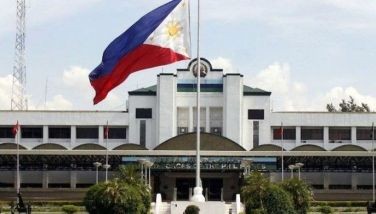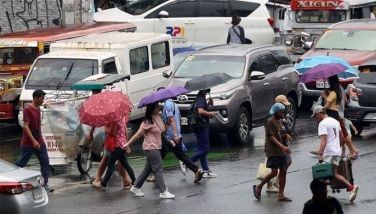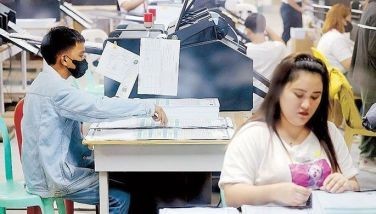$121-M WB funded project 'may be mother of all fertilizer scams'

The $121-million Small Coconut Farms Development Project (SCFDP), a World Bank-funded project, may be the “mother of all fertilizer scams,” according to the Citizen’s Debt Audit Commission (CDAC).
In a public hearing at the University of the Philippines’ College of Law yesterday, the CDAC said the SCFDP is “a grim reminder that the sins of the past are still being committed today.”
CDAC said the SCFDP, particularly the irregularities and anomalies surrounding it, bears striking resemblance, if not parallelisms, to the controversial Jocjoc Bolante’s P728-million fertilizer scam, Malacañang’s widely challenged Charter change initiative, and the debacle surrounding the Comprehensive Agrarian Reform Program (CARP).
CDAC evaluates and dissects loan agreements, debts and other “obligations” from the point of view of the public.
Its members include former Vice President Teofisto Guingona, former senator Wigberto Tañada, UP Sociology Professor Randy David, Dr. Eduardo Tadem (faculty, Asian Studies, University of the Philippines), former congressman Mario Joyo Aguja, economists Dr. Sixto Roxas and Joseph Lim, leading debt and development activists Lidy Nacpil, Ana Maria Nemenzo, Dr. Nymia Simbulan (executive director of PHILRIGHTS and faculty, University of the Philippines in Manila), Atty. Teddy Pascua (BANGON), Atty. Antonio Oposa (environmental lawyer), and Atty. Golda Benjamin of IDEALS.
The group also includes Fr. Ben Moraleda, Dr. Emmanuel Luna (UP CSWCD Professor), Bishop Efraim Tendero (national director of Philippine Council of Evangelical Churches or PCEC), Sr. Cres Lucero, Dr. Sylvia “Guy” Estrada Claudio (executive director of UP-Center for Women Studies), Eribert Padilla (auditor), Dr. Grace Gorospe-Jamon (president of the Association of Schools of Public Administration in the Philippines), Dr. Aurora Parong (executive director, Amnesty International Pilipinas) and Atty. Ipat Luna (environmental lawyer).
CDAC said the fertilizer scam “pales in comparison to the amount and the magnitude of alleged corruption, malversation and the negative impact surrounding SCFDP.”
The debt audit group said the project was conceived to supposedly address rural poverty, especially among small coconut farmers, through distribution of free farm inputs like fertilizers.
It was said to have been financed by a $121.8-million World Bank loan agreement entered into by the Philippine government on June 4, 1990.
But farmers claimed during the public hearing that SCFDP has been riddled with irregularities and widespread corruption involving government officials and private contractors.
The alleged irregularities ranged from complete non-delivery, sale of fertilizers to private companies engaged in trading or manufacturing fertilizers, up to the assertion that the loan agreement was “an unnecessary and burdensome debt.”
It was also reported that an estimated 40 percent of the funds intended for the project’s fertilizer deliveries had been malversed, the CDAC said.
The Commission on Audit (COA), the CDAC said, repeatedly raised questions concerning insufficient documentation pertaining to the distribution of fertilizers.
Similar findings have also surfaced in COA reports that as early as 1993, it was noted that previous findings and recommendations were not addressed or implemented.
Ian Rivera, national coordinator of the Makabayang Alyansa ng mga Magbubukid sa Pilipinas (Makabayan) and one of the two main presenters of the SCFDP case at the public hearing, said funds worth P275.730 million – personnel, equipment and facilities of the Philippine Coconut Authority (PCA) – were allegedly used to finance the campaign of the Ramos administration’s Charter change campaign.
Rivera quoted a 2000 report submitted by then PCA consultant Sergio Eulogio to then PCA Administrator Eduardo Escueta.
Eulogio said the supposed crash training (programs) during the early 1990s were allegedly manipulated and converted into convenient venues or political rallies to create a “critical mass of the population” supporting Ramos’ bid to amend the Constitution.
It was allegedly done by coordinating the delivery and collection of Coconut Farmers Information Sheets (CFIS), pursuant to a corporate order issued by PCA in November 1996 granting expanded insurance coverage to small coconut farmers with the collection or delivery of the signed People’s Initiative Signature Forms (PISFs) for Cha-cha.
A group called PIRMA campaigned to solicit six million signatures for the amendment of the Constitution to extend the term of former President Fidel Ramos.
“We will not be surprised if the Arroyo government will resort to the same tactic. Its folly of amending the Constitution to suit vested interests might have been inspired by this issue,” Rivera said.
The CDAC claimed that even the WB concurred with the report.
A supervision mission led by WB officials David Meadows and Jeffrey Gutman in August and September 1995 noted that a “crash training” of 2,000 coconut farmers in Leyte coincided with a town fiesta, which was substantially sponsored by the PCA.
The WB officials said little technical information was provided to the farmers, particularly on how to use the fertilizers, as the training “was essentially political in nature.”
However, despite this, WB hailed the project as one of its 25 successful projects.
Freedom from Debt Coalition (FDC) secretary Milo Tanchuling, who presented the second part of the case, said the project must be duly scrutinized not only because of the staggering amounts involved or because of its debt-creating implication, but also because it exposes the regretful state of the peasant sector.
“In a time when the dissolution of CARP hangs like a Damocles sword over the Filipino farmers’ heads, the continuing payment for a controversial foreign-funded project like SCFDP is certainly adding insult to injury. It is a clear case of double jeopardy – farmers will not only be deprived of CARP but will also bear the yoke of this burdensome debt,” Tanchuling said.
He said that as of 2008, a total of $124,040.73 million have already been paid – exceeding the original SCFDP loan amount of $121.8 million.
In the proposed 2009 Budget, Tanchuling said debt interest payment is P302 billion compared to the measly P14.3 billion allotted to agriculture and agrarian reform.
“The allotment to debt payments vis-à-vis important social programs tells a lot about government’s real priorities. It literally says, debt first, CARP later or never,” Tanchuling said.
The CDAC said it would not automatically render judgment at the end of the public hearing. Instead, CDAC would issue a final report when it feels that it already has sufficient information and analysis on the specific case.
The group plans to develop policy proposals and advocacy platforms based on findings of the audit and present the proposals to the government and various social movements and non-government organizations.
The group said it aims to develop a critical, comprehensive, participatory and transparent examination of public debt, loan agreements and other obligations based on data and existing studies by resource persons and organizations; study reports prepared by working groups and technical teams; and give testimonies and inputs from affected communities, social sectors and people’s organizations.
Farmers who testified during the public hearing were members of Makabayan, Nagkakaisang Magsasaka ng Bayan ng Buenavista, Quezon Kilusang Mangbubukid ng Bondok Peninsula, and Kalipunan ng mga Maliliit na Magniniyog sa Pilipinas.
- Latest
- Trending































